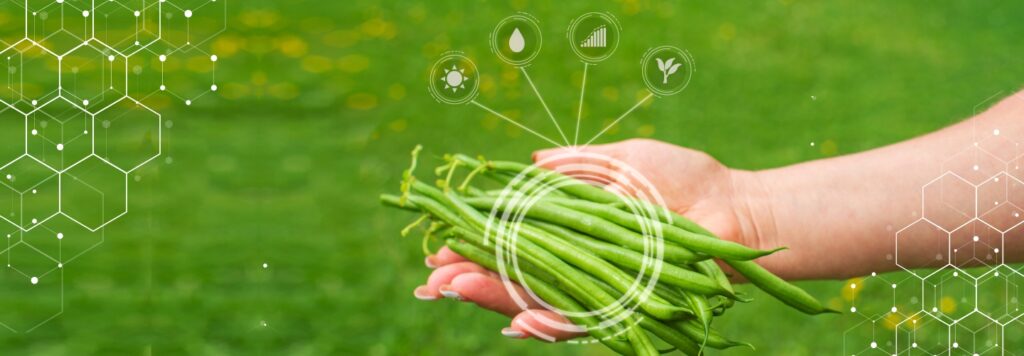IoT in Agriculture: Bolstering Food Safety and Traceability Practices

The global agrifood system spans various dynamic and interlinked stages of food production, processing, distribution, and consumption, with each stage consisting of different processes, value chains, numerous stakeholders, and their interactions. Food safety is a key part of such a system. However, food safety has been a paramount concern for consumers for a long time now, with the major outbreaks of foodborne illnesses and food recalls making headlines again amidst the COVID-19 pandemic.
But fighting the food safety and recalls challenge is easier said than done. It requires agribusinesses to refine procedures and trace each and every batch, right from the farms where agriproducts are produced to the stores where they are sold. Only then can enterprises be sure _of the quality of agriproducts and also be prepared to respond promptly to the issues of unsafe agriproducts and deal with the consequent food recalls.
IoT(Internet of Things) in agriculture can play a pivotal role in solving these issues and ensuring secure, sustainable and transparent food systems. Read on to know more about the significance of IoT in agriculture and understand how it can be instrumental in improving the food safety and traceability practices of agribusinesses.
How Technology is Transforming the Food Industry?
To ensure that the rising global population has access to nutritious, safe, and affordable food, technologies like the Internet of Things (IoT) are making headway in the agriculture and food industry. As different technologies continue to empower agribusinesses to make informed decisions, there has been a growing need for easier access to IoT in agriculture so as to make food production, manufacturing, and distribution more efficient.
IoT in agriculture has the potential to significantly affect the bottom line of food manufacturers. With a broad series of networked sensors and Internet-connected devices and equipment, IoT plays a revolutionary role in the entire food production, harvest management, and supply chain distribution process, right from the warehouse to the point of sale.
Internet of Agricultural Things – Future of Food Safety and Traceability
IoT in agriculture makes farming operations grow more intelligent and sophisticated, by providing accurate readings on temperature, moisture, soil health, and other variables. This helps in ensuring that the optimal growing conditions and harvest times are met. This technology is also gaining momentum and making valuable contributions to the farm-to-fork traceability process.
Boosting Logistics & Operational Efficiency
Changing consumer habits and a subsequent rise in competition in the food industry are prompting food manufacturers to streamline their logistics processes and maximise operational efficiency. IoT-approach to logistics involves the integration of workflows, the connection of systems, and the automation of processes that help agribusinesses identify potential risks along the entire supply chain and become more resilient in the long run.
In food production and processing areas, IoT can track and predict machinery maintenance that avoids unexpected downtimes and interruptions, and in turn, saves time and money. IoT sensors and warehouse inventory tracking devices can further help with the real-time tracking of agriproducts and assist in managing orders seamlessly.
Improving Traceability and Transparency
Traceability and transparency are important in the entire farm-to-restaurant, farm-to-fridge, or farm-to-fork journey. A great benefit of IoT technology lies in its ability to precisely monitor production and distribution activities. IoT devices produce live data and enable enhanced data collection and automated reporting, making it possible to closely monitor food safety data points and reduce the risks of foodborne illness outbreaks.
Apart from allowing food companies to pick up on malfunctions and alerts, IoT in agriculture can enable consumers to see the origin of their agriproducts and trace their entire journey. This way, agricultural traceability helps agricultural enterprises in maintaining utmost transparency which is critical to building consumer trust and loyalty.
Enhancing Food Safety and Authenticity
IoT technology along with cloud-based predictive analytics technologies provides real-time food safety data including humidity, temperature, soil health, etc. IoT can also play a role in flagging potential violations and raising the need for food safety inspection to identify possible food contamination or interruptions in safety chains.
In recent times, criminal activity within the global food system has been escalating. Shortages of certain food commodities and ingredients due to crop failures and increasing demand for organic and sustainable food are expected to be major drivers of fraud. To combat food fraud, IoT assigns a digital identification mark to any given product to separate them from its counterfeit counterparts. Moreover, these product authenticity labels are highly beneficial in building consumer trust.
Reducing Food Waste
According to the United Nations, about 14% of produce is lost between harvest and retail while an estimated 17% of total global food production is wasted. IoT in agriculture can be a great remedy to significantly reduce food waste by gaining more control over food value chains. Food manufacturers can harness IoT technology to automate the process of tracking food stocks in real-time and place orders for new ingredients and supplies based on actual needs.
In logistics, the implementation of IoT sensors in pallets when harvesting or transporting foods can directly improve food safety and traceability by monitoring shipping times and temperatures. Based on the exposure to different conditions, when foods travel for an extended time and over longer distances, IoT can alert receiving warehouses to adjust environmental components and protect these foods to stay in the supply chain.
Today, as consumers increasingly demand greater access to better food on-demand, food producers and manufacturers are looking for innovative ways of providing safe, healthy, and ethical solutions. By making the most of IoT and other technologies, FarmERP presents food manufacturers with powerful solutions to solve complex problems related to food safety and traceability. Contact us to get a complete picture of how IoT can help improve food safety and traceability practices for your agribusiness.
